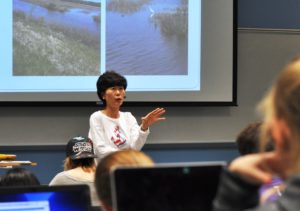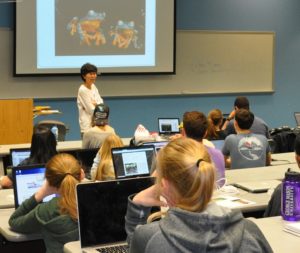EVPP 337: Keeping Current in a Rapidly Changing Environment
In the six years that Younsung Kim has taught EVPP 337: Environmental Policymaking in Developing Countries, she has seen myriad changes in climate, politics, and policy. Consequently, providing her students with the latest information can be a challenge.
When considering online and OER materials for her class, Kim knew she was facing a difficult task. She reports that the information found online is either too cumbersome for her undergraduate juniors and seniors, or sometimes not technical enough. “Finding that balance of content on these evolving issues has been difficult,” says Kim. “And, too often, the source location is unstable. One month source documents are searchable and the link can be identified and the next month the link has changed or disappeared.”
 With so much information out there, and limited time and resources to carefully vet the materials presented online, Kim chose to narrow the wide breath of the course to three modules “Environmental Conflicts in Developing Countries,” “Climate Change,” and “Energy.”
With so much information out there, and limited time and resources to carefully vet the materials presented online, Kim chose to narrow the wide breath of the course to three modules “Environmental Conflicts in Developing Countries,” “Climate Change,” and “Energy.”
Kim then began the arduous task of winnowing down the materials to something digestible, yet engaging, for her students. “As environmental and sustainability issues are changing at a breakneck speed, there are numerous materials necessary to review,” explains Kim. Case in point: the emerging water conflict in Asia. Kim wanted her students to consider the role of China as the origin of many large Asian rivers, and potential water diversion from these transnational rivers on lower riparian states such as India, Bangladesh, Vietnam and Laos — a weighty topic, indeed. That weight needed to be counterbalanced by a learning diversion… So when Kim identified several interactive and fun online games which incorporated critical thinking on these important subjects, she knew she wanted to include them in her course modules.
The 4-VA grant provided Kim funding for the hours necessary to compile the research data, noting, “There’s still so much that can and should be done, but thanks to the 4-VA funding, it meant there was financial support necessary to begin this process.”
data, noting, “There’s still so much that can and should be done, but thanks to the 4-VA funding, it meant there was financial support necessary to begin this process.”
